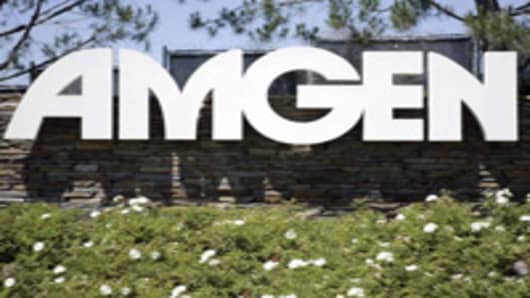Amgenreported a 7 percent increase in adjusted profit that topped Wall Street forecasts, although sales of some of its most important products fell short of Wall Street estimates and the company slightly lowered its full-year revenue forecast.
Shares hardly moved, however, as investors were already looking ahead to focus on the company's new osteoporosis drug Prolia, which is just being launched and is widely expected to be Amgen's most important future growth driver.
The company is hoping for an additional U.S. approval for the drug, also known as denosumab, as soon as November for reducing fractures and other skeletal problems in patients whose cancer has spread to the bone.
"This was every bit the mixed quarter that people expected it to be, and with the quarter behind us people will look forward to better times at Amgen, specifically the data on denosumab expected later this year," said Cowen and Co. analyst Eric Schmidt.
The biotechnology bellwether turned in adjusted earnings of $1.38 a share in the second quarter, up from $1.29 a share last year.
Sales rose 2 percent to $3.8 billion, against $3.71 billion a year earlier.
Equity analysts were looking for $1.30 a share on sales of $3.74 billion, according to a consensus estimate compiled by Thomson Reuters.
But the company said that due to the impact of a weaker euro it now expects full-year revenue to come in slightly below $15.1 billion, which had been the bottom of its prior forecast range.
Amgen continues to expect 2010 adjusted earnings at the low end of its forecast range of $5.05 to $5.25 per share.
Amgen stock edged slightly lower in extended trading Thursday. Get after-hour quotes for Amgen here.
The company's stock finished the regular Nasdaq session down slightly at $53.54 on volume exceeding 5.7 million shares.
Amgen's total product sales declined 1 percent excluding currency effects. Internationally, sales rose 2 percent on the same basis.
"We are in the process of launching Prolia worldwide and look forward to working with global regulatory authorities to gain approval for denosumab in patients with advanced cancer," said Kevin Sharer, CEO of Amgen, in a prepared statement.
Sales of the anemia drug Aranesp, which have been under assault due to safety concerns and reimbursement restrictions, fell 13 percent to $603 million, falling well short of analyst expectations for $640.9 million.
However, sales of the older drug Epogen, a red blood cell booster, rose 3 percent to $657 million, exceeding Wall Street estimates of $653.4 million.
Sales of the rheumatoid arthritis drug Enbrel also were a bit disappointing, falling 2 percent to $877 million, just shy of estimates for $879.5 million. Enbrel is a medicine that has often exceeded expectations in past quarters.
Combined worldwide sales of the white blood cell boosters Neupogen and Neulasta rose 1 percent to $1.17 billion, while Wall Street was looking for $1.19 billion.
"Most of the products fell a little short of expectations," said Schmidt, noting "pressures out of Europe both on foreign exchange and on pricing."
"But they protected you on bottom line with some nice cost savings and they will continue to do so for the remainder of the year," he said.
Calculated in accordance with Generally Accepted Accounting Principles (GAAP), Amgen reported a profit of $1.25 a share, unchanged from a year earlier.


